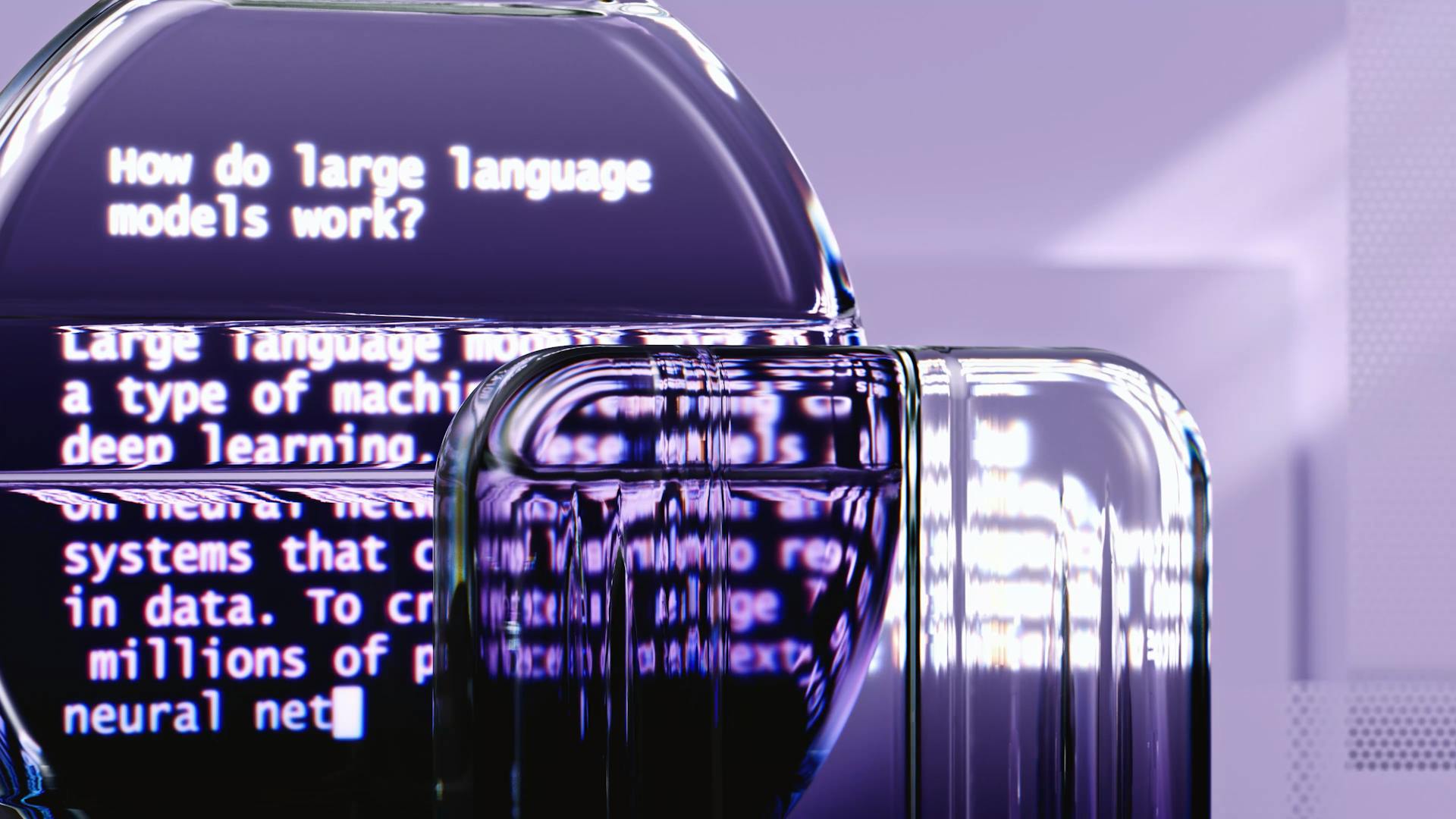
Generative AI is poised to revolutionize the way we work, making knowledge work more efficient and productive. According to recent studies, generative AI can automate up to 70% of routine tasks, freeing up employees to focus on high-value tasks that require creativity and problem-solving skills.
With generative AI, knowledge workers can expect to see significant productivity gains, with some studies suggesting an increase of up to 30% in work output. This is because AI can handle tasks such as data entry, research, and content generation, allowing humans to focus on higher-level tasks that require critical thinking and creativity.
By automating routine tasks, generative AI can also help reduce errors and increase accuracy, leading to better decision-making and outcomes. For example, AI-powered tools can help identify biases in data and provide more accurate predictions, leading to better business decisions.
You might enjoy: Generative Ai Photoshop Increase Quality
Generative AI's Impact on Knowledge Work
AI is changing the game for knowledge workers, and it's not just about automating tasks. AI's capacity to learn and adapt makes it capable of reshaping and automating a broader range of tasks than traditional automation.
Recent studies have shown that AI is likely to impact white-collar or professional jobs, which are typically considered immune to automation. This includes roles requiring creativity or complex cognitive skills.
The good news is that AI can also have a positive impact on productivity and democratization of skills. Studies have suggested that AI can improve worker productivity across tasks like business writing, programming, customer support, and consulting.
Less-experienced, lower-skilled workers may be at an advantage when using AI tools, although training is advisable to effectively leverage the technology.
Additional reading: Impact of Generative Ai
Changes in Job Roles and Responsibilities
Generative AI is changing the way we work, and job roles are shifting as a result. AI may impact jobs that were previously thought to be safe from automation, including roles requiring creativity or complex cognitive skills.
Recent studies using O*NET data have found that white-collar or professional jobs are more susceptible to AI disruption. These jobs typically require higher education and offer higher pay, making them prone to technological disruption by AI.
New AI jobs are emerging to improve the work environment and employee efficiency.
See what others are reading: Generative Ai in Higher Education
May Impact Jobs
Jobs that were previously thought to be safe from automation may be impacted by AI. AI has the potential to influence jobs traditionally considered immune to automation, including roles requiring creativity or complex cognitive skills.
Recent studies have attempted to predict which occupations are most susceptible to AI disruption, and a significant finding is that white-collar or professional jobs are prone to technological disruption by AI. These jobs typically require higher education and offer higher pay.
AI is capable of replicating and extending human cognitive functions through advanced technologies like machine learning and natural language processing. This capacity to learn and adapt makes AI capable of reshaping and automating a broader range of tasks than traditional automation.
Occupations that are least exposed to AI disruption tend to be physical and/or outdoor occupations. However, it's unknown to what degree these occupations may be impacted, and many factors must align for AI to have a transformative effect on the workforce.
Readers also liked: Generative vs Cognitive Ai
New Jobs in Today's Environment
New Jobs in Today's Environment have emerged with the introduction of AI-powered tools. Generative AI has enhanced workplaces and employees alike, leading to the creation of new roles focused on improving the work environment and employee efficiency.
As a result, companies are now hiring Prompt Engineers to design prompts that guide generative AI models in producing desired outcomes. These experts form a link between human intent and what the AI can actually do.
AI-Generated Work Auditors review and ensure the quality and integrity of AI-generated content and data. They look for issues like factual inconsistencies, stylistic inconsistencies, or potential biases in language.
These new roles require professionals to refine AI responses for accuracy, clarity, and inclusivity. By doing so, they help maintain the trustworthiness and reliability of AI-generated content.
For another approach, see: Google Announces New Generative Ai Search Capabilities for Doctors
Content Creator
Content creators are leveraging AI tools to generate innovative content, including text, images, and videos. They craft engaging and informative content, often including editing, graphic design, or video production.
On a similar theme: Generative Ai for Content Creation
AI can assist content creators in processing large amounts of data and facilitating decision-making, making their jobs more efficient. This is a significant finding across studies that evaluate the likelihood of AI disruption in various occupations.
Content creators who learn to use AI tools effectively may be at an advantage, particularly less-experienced workers. Studies have shown that workers who use AI tools tend to improve their performance and productivity.
AI-generated content can be used to democratize access to knowledge and skills, making it widely accessible without requiring programming skills. This technology is widely available, and experts are discussing its potential to democratize access to knowledge and skills.
Consider reading: Generative Ai Skills
Future of Work and Skills
Generative AI is transforming the way we work, and it's having a significant impact on the skills we need to succeed. This technology is making it possible for anyone to learn new skills and knowledge quickly and easily.
Less-experienced workers, in particular, are at an advantage when using AI tools, as they can improve their performance and productivity across various tasks. Studies have shown that AI can benefit worker productivity in areas like business writing, programming, and customer support.
Readers also liked: Google Cloud Skills Boost Generative Ai
As AI continues to evolve, it's creating a collaborative environment that empowers employees to excel at their jobs. This technology is not replacing human workers, but rather augmenting their abilities and freeing them up to focus on more strategic and creative work.
With AI, businesses and individuals can unlock the immense potential of this technology and thrive in the years to come. By embracing AI and fostering a culture of continuous learning, we can adapt to the changing work landscape and stay ahead of the curve.
Worth a look: Roundhill Generative Ai & Technology Etf
Benefits and Opportunities
Generative AI has the potential to significantly boost productivity in knowledge work. Several studies have shown that AI can help workers complete tasks faster and with higher quality, particularly among less-experienced and lower-skilled workers.
AI can be a game-changer for workers who learn to use it effectively. By leveraging AI tools, workers can free up time for more complex and creative tasks, leading to improved overall performance.
The benefits of AI extend beyond productivity gains, as it can also democratize access to knowledge and skills. This is because AI tools are widely accessible, even for those without programming skills.
With AI, workers can gain a significant advantage, especially those who are new to a field or industry. By using AI tools, they can quickly get up to speed and start producing high-quality work.
A fresh viewpoint: What Are the Generative Ai Tools
Foundation and Types
Foundation models are a type of generative AI that learn general patterns in data to generate new content. These models are trained on massive datasets of unlabeled data, allowing them to create new products and services like chatbots, virtual assistants, and image-generation tools.
Some popular AI foundation models include GPT-3, Megatron-Turing NLG, and Jurassic-1 Jumbo. These models are still under development but have the potential to revolutionize many industries.
AI enablement is essential for businesses to succeed in the age of AI, and it comes in three types: technical, process, and cultural enablement. Technical enablement provides employees with the tools and resources they need to use AI effectively, while process enablement changes the way work is done to take advantage of AI. Cultural enablement creates a culture of experimentation and encourages employees to share ideas.
Here are the three types of AI enablement in more detail:
Foundation Models
Foundation models are a type of generative AI that's trained on massive datasets of unlabeled data, allowing them to learn general patterns in data that can be used to generate new content.
These models are often used to create new products and services, such as chatbots, virtual assistants, and image-generation tools.
Some popular AI foundation models include GPT-3, Megatron-Turing NLG, and Jurassic-1 Jumbo, all of which are large language models developed by OpenAI, Google AI, and Hugging Face respectively.
These foundation models have the potential to revolutionize many industries, such as creating more realistic chatbots, generating more creative content, and improving the accuracy of machine translation.
Worth a look: New Generative Ai
Types of
There are three main types of AI enablement that businesses should focus on. Each type plays a crucial role in empowering employees to use AI effectively.
Technical enablement is all about providing employees with the tools and resources they need to use AI. This includes giving them access to AI-powered tools and platforms, as well as training on how to use these tools.
Intriguing read: Top Generative Ai Tools

Process enablement is about changing the way work is done to take advantage of AI. This involves automating tasks, streamlining processes, and creating new workflows that are optimized for AI.
Cultural enablement is focused on changing the culture of the organization to be more supportive of AI. This includes creating a culture of experimentation, encouraging employees to share ideas, and rewarding success.
Here are the three types of AI enablement in a concise list:
- Technical enablement: Provides employees with the tools and resources to use AI effectively.
- Process enablement: Changes the way work is done to take advantage of AI.
- Cultural enablement: Creates a culture that supports AI adoption.
By understanding and implementing these three types of AI enablement, businesses can set themselves up for success in the age of AI.
Sources
- https://www.scheller.gatech.edu/news/2023/how-generative-ai-will-transform-knowledge-work.html
- https://www.expresscomputer.in/artificial-intelligence-ai/gen-ai/how-generative-ai-will-transform-how-work-gets-done/104219/
- https://www.commerce.nc.gov/news/the-lead-feed/generative-ai-and-future-work
- https://datasciencedojo.com/blog/generative-ai-future-of-work/
- https://www.gsb.stanford.edu/insights/generative-ai-can-boost-productivity-without-replacing-workers
Featured Images: pexels.com


